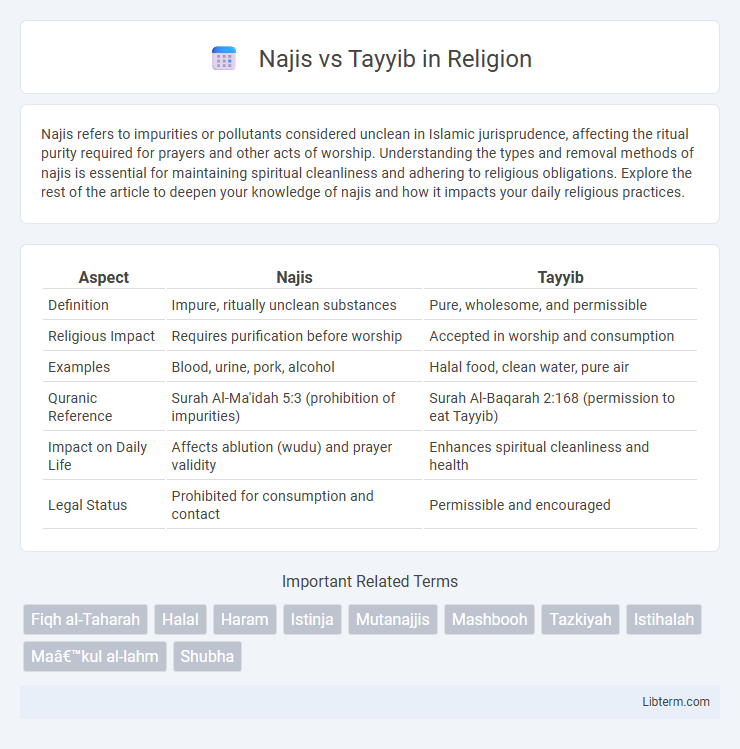Najis refers to impurities or pollutants considered unclean in Islamic jurisprudence, affecting the ritual purity required for prayers and other acts of worship. Understanding the types and removal methods of najis is essential for maintaining spiritual cleanliness and adhering to religious obligations. Explore the rest of the article to deepen your knowledge of najis and how it impacts your daily religious practices.
Table of Comparison
| Aspect | Najis | Tayyib |
|---|---|---|
| Definition | Impure, ritually unclean substances | Pure, wholesome, and permissible |
| Religious Impact | Requires purification before worship | Accepted in worship and consumption |
| Examples | Blood, urine, pork, alcohol | Halal food, clean water, pure air |
| Quranic Reference | Surah Al-Ma'idah 5:3 (prohibition of impurities) | Surah Al-Baqarah 2:168 (permission to eat Tayyib) |
| Impact on Daily Life | Affects ablution (wudu) and prayer validity | Enhances spiritual cleanliness and health |
| Legal Status | Prohibited for consumption and contact | Permissible and encouraged |
Introduction to Najis and Tayyib
Najis refers to substances considered ritually impure in Islamic jurisprudence, including blood, urine, and certain animal by-products, which require cleansing before allowing physical contact or use in religious practices. Tayyib denotes what is pure, wholesome, and permissible for consumption and use, emphasizing cleanliness and ethical sourcing in accordance with Sharia law. Understanding the distinction between Najis and Tayyib is crucial for maintaining spiritual purity and fulfilling religious obligations in daily life.
Definitions: What is Najis? What is Tayyib?
Najis refers to substances or items considered ritually impure in Islamic jurisprudence, including blood, urine, and certain animals, which must be avoided or cleansed before acts of worship. Tayyib denotes food and objects that are pure, wholesome, and permissible for consumption or use, aligning with Islamic dietary laws and ethical standards. Understanding the distinction between najis and tayyib is essential for maintaining ritual purity and adhering to halal guidelines in daily life.
The Importance of Purity in Islamic Teachings
Najis refers to impurities considered ritually unclean in Islamic jurisprudence, including substances like blood, urine, and certain animal by-products, while Tayyib signifies wholesome and pure elements permissible for consumption and use. Maintaining purity is essential in Islamic teachings, as it directly impacts the validity of prayers, ablution, and overall spiritual cleanliness, reflecting obedience to divine commandments. Emphasizing Tayyib ensures adherence to halal standards, promoting health, ethical consumption, and spiritual well-being within the Muslim community.
Common Examples of Najis Substances
Najis substances in Islamic jurisprudence include blood, urine, feces, alcohol, and pork, which are considered ritually impure and must be cleansed before prayer. Other common examples of najis are dogs, carrion, and any materials contaminated with najis substances, mandating thorough purification through washing or other prescribed methods. Distinguishing najis from tayyib, which refers to pure and wholesome items, is crucial for maintaining ritual cleanliness and fulfilling religious obligations.
Characteristics That Define Tayyib
Tayyib is characterized by its purity, wholesomeness, and acceptability in both physical and spiritual contexts, encompassing food, behavior, and actions that are beneficial and clean. It must comply with Islamic dietary laws, being free from harmful substances, impurities (najis), and unethical processes, ensuring it promotes health and well-being. The concept of Tayyib extends beyond mere permissibility (halal) to include ethical sourcing, cleanliness, and the overall benefit to body and soul.
Scriptural References: Najis and Tayyib in the Qur’an and Sunnah
The Qur'an distinguishes between najis (impure) and tayyib (pure and wholesome) primarily in the context of dietary laws, as seen in Surah Al-Baqarah (2:172) which commands believers to eat from what is tayyib on earth and avoid the najis and haram. The Sunnah complements this by detailing specific impurities considered najis, such as blood and urine, and prescribing purification methods, as reported in Sahih Muslim where the Prophet Muhammad (PBUH) emphasized the importance of physical and spiritual cleanliness. These scriptural sources collectively define najis and tayyib, guiding Islamic jurisprudence on purity and permissible consumption.
Implications for Food and Daily Life
Najis and Tayyib are critical concepts in Islamic jurisprudence affecting food consumption and daily practices. Najis refers to substances considered ritual impurities, such as blood, pork, and alcohol, which are prohibited and require purification rituals to maintain spiritual cleanliness. Tayyib denotes lawful, pure, and wholesome items, emphasizing permissible food and ethical consumption, thereby shaping dietary laws and personal hygiene in Muslim life.
Najis vs Tayyib: Key Differences Explained
Najis refers to substances considered ritually impure in Islamic law, such as blood, urine, and alcohol, which require cleansing before worship or consumption. Tayyib denotes things that are pure, wholesome, and permissible to consume or use, emphasizing cleanliness and ethical sourcing in food and materials. Understanding the key differences between Najis and Tayyib is essential for practicing Muslims to maintain spiritual purity and comply with halal dietary laws.
Practical Guidance for Identifying Najis and Tayyib
Najis refers to substances considered ritually impure in Islamic law, including blood, urine, and carrion, while Tayyib denotes what is pure and permissible for consumption and use. To identify Najis, Muslims observe specific criteria such as the presence of contaminants that violate cleanliness rules outlined in the Quran and Hadith. Practical guidance involves checking for substances like alcohol or pork derivatives in food products and ensuring water purity for purification, helping maintain spiritual and physical cleanliness essential for worship and daily life.
Conclusion: Choosing Tayyib and Avoiding Najis
Selecting Tayyib (pure and wholesome) over Najis (impure) is essential for maintaining spiritual and physical cleanliness in Islamic practice. Consuming Tayyib food and using pure materials align with the principles of halal, ensuring blessings and health benefits. Avoiding Najis substances protects believers from ritual impurity, reinforcing a lifestyle dedicated to divine obedience and ethical living.
Najis Infographic

 libterm.com
libterm.com